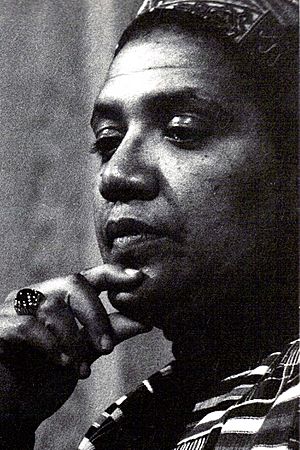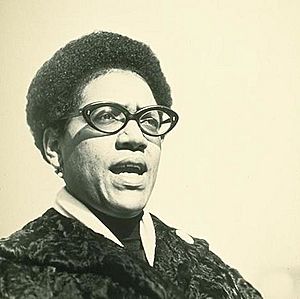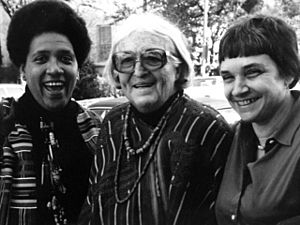Audre Lorde facts for kids
Quick facts for kids
Audre Lorde
|
|
|---|---|

Lorde in 1980
|
|
| Born | Audrey Geraldine Lorde February 18, 1934 New York City, U.S. |
| Died | November 17, 1992 (aged 58) Saint Croix, Virgin Islands, U.S. |
| Education | National Autonomous University of Mexico Hunter College (BA) Columbia University (MLS) |
| Genre | Poetry Nonfiction |
| Notable works | The First Cities Zami: A New Spelling of My Name The Cancer Journals |
| Spouse |
Edwin Rollins
(m. 1962; div. 1970) |
| Partner | Gloria Joseph |
| Children | 2 |
Audre Lorde ( born Audrey Geraldine Lorde; February 18, 1934 – November 17, 1992) was an American writer, womanist, radical feminist, professor, and civil rights activist.
Her poems and prose largely deal with issues related to civil rights, feminism, illness and disability, and the exploration of black female identity.
Contents
Early life
Lorde was born in New York City on February 18, 1934 to Frederick Byron Lorde (known as Byron) and Linda Gertrude Belmar Lorde. Lorde's mother was of mixed ancestry but could pass for Spanish, which was a source of pride for her family. Lorde's father was darker than the Belmar family liked, and they only allowed the couple to marry because of Byron's charm, ambition, and persistence.
The new family settled in Harlem. Lorde was almost blind. The youngest of three daughters (her two older sisters were named Phyllis and Helen), she grew up hearing her mother's stories about the West Indies. At the age of four, she learned to talk while she learned to read, and her mother taught her to write at around the same time.
As a child, Lorde struggled with communication, and came to appreciate the power of poetry as a form of expression. In fact, she describes herself as thinking in poetry. She also memorized a great deal of poetry, and would use it to communicate. Around the age of twelve, she began writing her own poetry and connecting with others at her school who were considered "outcasts", as she felt she was.
Education
Raised Catholic, Lorde attended parochial schools before moving on to Hunter College High School, a secondary school for intellectually gifted students. She graduated in 1951.
While attending Hunter, Lorde published her first poem in Seventeen magazine. Also in high school, Lorde participated in poetry workshops sponsored by the Harlem Writers Guild.
Career

In 1954, she spent a pivotal year as a student at the National University of Mexico. During this time, she confirmed her identity on personal and artistic levels as both a lesbian and a poet. On her return to New York, Lorde attended Hunter College, and graduated in the class of 1959. While there, she worked as a librarian, continued writing. She furthered her education at Columbia University, earning a master's degree in library science in 1961. During this period, she worked as a public librarian in nearby Mount Vernon, New York.
In 1968 Lorde was writer-in-residence at Tougaloo College in Mississippi. Lorde's time at Tougaloo College, like her year at the National University of Mexico, was a formative experience for her as an artist. She led workshops with her young, black undergraduate students, many of whom were eager to discuss the civil rights issues of that time. Her book of poems, Cables to Rage, came out of her time and experiences at Tougaloo.
From 1972 to 1987, Lorde resided on Staten Island. During that time, in addition to writing and teaching she co-founded Kitchen Table: Women of Color Press.
In 1977, Lorde became an associate of the Women's Institute for Freedom of the Press (WIFP). WIFP is an American nonprofit publishing organization. The organization works to increase communication between women and connect the public with forms of women-based media.
Lorde taught in the Education Department at Lehman College from 1969 to 1970, then as a professor of English at John Jay College of Criminal Justice (part of the City University of New York, CUNY) from 1970 to 1981. There, she fought for the creation of a black studies department. In 1981, she went on to teach at her alma mater, Hunter College (also CUNY), as the distinguished Thomas Hunter chair.
In 1980, together with Barbara Smith and Cherríe Moraga, she co-founded Kitchen Table: Women of Color Press, the first U.S. publisher for women of color. Lorde was State Poet of New York from 1991 to 1992.
In 1981, Lorde was among the founders of the Women's Coalition of St. Croix. In the late 1980s, she also helped establish Sisterhood in Support of Sisters (SISA) in South Africa to benefit black women who were affected by apartheid and other forms of injustice.
In 1985, Audre Lorde was a part of a delegation of black women writers who had been invited to Cuba. The trip was sponsored by The Black Scholar and the Union of Cuban Writers. She embraced the shared sisterhood as black women writers. They visited Cuban poets Nancy Morejon and Nicolas Guillen.
The Berlin years
In 1984, Lorde started a visiting professorship in West Berlin at the Free University of Berlin. She was invited by FU lecturer Dagmar Schultz who had met her at the UN "World Women's Conference" in Copenhagen in 1980. During her time in Germany, Lorde became an influential part of the then-nascent Afro-German movement. Together with a group of black women activists in Berlin, Audre Lorde coined the term "Afro-German" in 1984 and, consequently, gave rise to the Black movement in Germany. During her many trips to Germany, Lorde became a mentor to a number of women, including May Ayim, Ika Hügel-Marshall, and Helga Emde. Instead of fighting systemic issues through violence, Lorde thought that language was a powerful form of resistance and encouraged the women of Germany to speak up instead of fighting back. Her impact on Germany reached more than just Afro-German women; Lorde helped increase awareness of intersectionality across racial and ethnic lines.
Lorde's impact on the Afro-German movement was the focus of the 2012 documentary by Dagmar Schultz. Audre Lorde: The Berlin Years 1984–1992 was accepted by the Berlin Film Festival, Berlinale, and had its World Premiere at the 62nd Annual Festival in 2012. The film has gone on to film festivals around the world, and continued to be viewed at festivals until 2018. The documentary has received seven awards, including Winner of the Best Documentary Audience Award 2014 at the 15th Reelout Queer Film + Video Festival, the Gold Award for Best Documentary at the International Film Festival for Women, Social Issues, and Zero Discrimination, and the Audience Award for Best Documentary at the Barcelona International LGBT Film Festival. Audre Lorde: The Berlin Years revealed the previous lack of recognition that Lorde received for her contributions towards the theories of intersectionality.
Poetry

Early works
Lorde's poetry was published very regularly during the 1960s – in Langston Hughes' 1962 New Negro Poets, USA; in several foreign anthologies; and in black literary magazines. During this time, she was also politically active in civil rights, anti-war, and feminist movements.
In 1968, Lorde published The First Cities, her first volume of poems. It was edited by Diane di Prima, a former classmate and friend from Hunter College High School. The First Cities has been described as a "quiet, introspective book", and Dudley Randall, a poet and critic, asserted in his review of the book that Lorde "does not wave a black flag, but her Blackness is there, implicit, in the bone".
Her second volume, Cables to Rage (1970), which was mainly written during her tenure as poet-in-residence at Tougaloo College in Mississippi, addressed themes of love, betrayal, childbirth, and the complexities of raising children. It is particularly noteworthy for the poem "Martha", in which Lorde openly confirms her homosexuality for the first time in her writing: "[W]e shall love each other here if ever at all."
Nominated for the National Book Award for poetry in 1973, From a Land Where Other People Live (Broadside Press) shows Lorde's personal struggles with identity and anger at social injustice. The volume deals with themes of anger, loneliness, and injustice, as well as what it means to be a black woman, mother, friend, and lover.
1974 saw the release of New York Head Shop and Museum, which gives a picture of Lorde's New York through the lenses of both the civil rights movement and her own restricted childhood: stricken with poverty and neglect and, in Lorde's opinion, in need of political action.
Wider recognition
The release of Coal in 1976 established Lorde as an influential voice in the Black Arts Movement and introduced her to a wider audience. The volume includes poems from both The First Cities and Cables to Rage. Lorde followed Coal up with Between Our Selves (also in 1976) and Hanging Fire (1978).
In Lorde's volume The Black Unicorn (1978), she describes her identity within the mythos of African female deities of creation, fertility, and warrior strength.
Lorde's poetry became more open and personal as she grew older. In Sister Outsider: Essays and Speeches, Lorde states, "Poetry is the way we help give name to the nameless so it can be thought... As they become known to and accepted by us, our feelings and the honest exploration of them become sanctuaries and spawning grounds for the most radical and daring ideas." Sister Outsider also elaborates Lorde's challenge to European-American traditions.
Theory
Her writings are based on the "theory of difference", the idea that the binary opposition between men and women is overly simplistic; although feminists have found it necessary to present the illusion of a solid, unified whole, the category of women itself is full of subdivisions.
Lorde identified issues of race, class, age and ageism, chronic illness and disability; the latter becoming more prominent in her later years as she lived with cancer. She wrote of all of these factors as fundamental to her experience of being a woman. She argued that, although differences in gender have received all the focus, it is essential that these other differences are also recognized and addressed.
Personal life
In 1962, Lorde married attorney Edwin Rollins, who was a white, gay man. She and Rollins divorced in 1970 after having two children, Elizabeth and Jonathan. In 1966, Lorde became head librarian at Town School Library in New York City, where she remained until 1968.
During her time in Mississippi in 1968, she met Frances Clayton, a white professor of psychology who became her romantic partner until 1989. Their relationship continued for the remainder of Lorde's life.
Lorde was briefly romantically involved with the sculptor and painter Mildred Thompson after meeting her in Nigeria at the Second World Black and African Festival of Arts and Culture (FESTAC 77). The two were involved during the time that Thompson lived in Washington, D.C.
Lorde and her life partner, black feminist Dr. Gloria Joseph, resided together on Joseph's native land of St. Croix. Lorde and Joseph had been seeing each other since 1981, and after Lorde's liver cancer diagnosis, she officially left Clayton for Joseph, moving to St. Croix in 1986. The couple remained together until Lorde's death. Together they founded several organizations such as the Che Lumumba School for Truth, Women's Coalition of St. Croix, U.S. Virgin Islands, Sisterhood in Support of Sisters in South Africa, and Doc Loc Apiary.
Last years
From 1991 until her death, she was the New York State Poet laureate. In 1992, she received the Bill Whitehead Award for Lifetime Achievement from Publishing Triangle. In 2001, Publishing Triangle instituted the Audre Lorde Award to honour works of lesbian poetry.
Lorde died of breast cancer at the age of 58 on November 17, 1992, in St. Croix, where she had been living with Gloria Joseph. In an African naming ceremony before her death, she took the name Gamba Adisa, which means "Warrior: She Who Makes Her Meaning Known".
Honors
- 1979, 1983: MacDowell fellowship
- 1991–1992: New York State Poet laureate.
Legacy
The Callen-Lorde Community Health Center, an organization in New York City named for Michael Callen and Lorde, is dedicated to providing medical health care to the city's LGBT population without regard to ability to pay. Callen-Lorde is the only primary care center in New York City created specifically to serve the LGBT community.
The Audre Lorde Project, founded in 1994, is a Brooklyn-based organization for LGBT people of color. The organization concentrates on community organizing and radical nonviolent activism around progressive issues within New York City, especially relating to LGBT communities, AIDS and HIV activism, pro-immigrant activism, prison reform, and organizing among youth of color.
In June 2019, Lorde was one of the inaugural fifty American "pioneers, trailblazers, and heroes" inducted on the National LGBTQ Wall of Honor within the Stonewall National Monument (SNM) in New York City's Stonewall Inn.
The archives of Audre Lorde are located across various repositories in the United States and Germany. The Audre Lorde Papers are held at Spelman College Archives in Atlanta. Held at John F. Kennedy Institute of North American Studies at Free University of Berlin (Freie Universität), the Audre Lorde Archive holds correspondence and teaching materials related to Lorde's teaching and visits to Freie University from 1984 to 1992. The Audre Lorde collection at Lesbian Herstory Archives in New York contains audio recordings related to the March on Washington on October 14, 1979, which dealt with the civil rights of the gay and lesbian community as well as poetry readings and speeches.
Interesting facts about Audre Lorde
- Lorde was nearsighted to the point of being legally blind.
- She wrote her first poem when she was in eighth grade.
- Born as Audrey Geraldine Lorde, she chose to drop the "y" from her first name while still a child, explaining that she was more interested in the artistic symmetry of the "e"-endings in the two side-by-side names "Audre Lorde" than in spelling her name the way her parents had intended.
- In 2014 Lorde was inducted into the Legacy Walk, an outdoor public display in Chicago, Illinois, that celebrates LGBT history and people.
- The Audre Lorde Award is an annual literary award presented by Publishing Triangle to honor works of lesbian poetry, first presented in 2001.
- In June 2019, Lorde's residence in Staten Island was given landmark designation by the New York City Landmarks Preservation Commission.
- For their first match of March 2019, the women of the United States women's national soccer team each wore a jersey with the name of a woman they were honoring on the back; Megan Rapinoe chose the name of Lorde.
- In January 2021, Audre was named an official "Broad You Should Know" on the podcast Broads You Should Know.
- On February 18, 2021, Google celebrated her 87th birthday with a Google Doodle.
- On April 29, 2022, the International Astronomical Union approved the name Lorde for a crater on Mercury.
- On May 10, 2022, 68th Street and Lexington Avenue by Hunter College was renamed "Audre Lorde Way."
Audre Lorde quotes
- “Your silence will not protect you.”
- “When I dare to be powerful, to use my strength in the service of my vision, then it becomes less and less important whether I am afraid.”
- “Caring for myself is not self-indulgence, it is self-preservation, and that is an act of political warfare.”
- “There is no thing as a single-issue struggle because we do not live single-issue lives.”
- “Pain is important: how we evade it, how we succumb to it, how we deal with it, how we transcend it.”
- “Our feelings are our most genuine paths to knowledge.”
- “Without community, there is no liberation.”
Works
Poetry Books
- The First Cities. New York City: Poets Press. 1968. OCLC 12420176.
- Cables to Rage. London: Paul Breman. 1970. OCLC 18047271.
- From a Land Where Other People Live. Detroit: Broadside Press. 1973. ISBN 978-0-910296-97-7.
- New York Head Shop and Museum. Detroit: Broadside Press. 1974. ISBN 978-0-910296-34-2.
- Coal. New York: W. W. Norton Publishing. 1976. ISBN 978-0-393-04446-1.
- Between Our Selves. Point Reyes, California: Eidolon Editions. 1976. OCLC 2976713.
- Hanging Fire. 1978.
- The Black Unicorn. New York: W. W. Norton Publishing. 1978. ISBN 978-0-393-31237-9.
- Chosen Poems: Old and New. New York: W. W. Norton Publishing. 1982. ISBN 978-0-393-30017-8.
- Our Dead Behind Us. New York: W. W. Norton Publishing. 1986. ISBN 978-0-393-30327-8.
- The Marvelous Arithmetics of Distance: Poems 1987-1992. New York: W. W. Norton Publishing. 1993. ISBN 978-0-393-03513-1.
- The Collected Poems of Audre Lorde. W. W. Norton Publishing. 1997. ISBN 9780393040906.
- Your Silence Will Not Protect You : Essays and Poems. Silver Press. 2017. ISBN 9780995716223.
Prose Books
- The Cancer Journals. San Francisco: Aunt Lute Books. 1980. ISBN 978-1-879960-73-2.
- Zami: A New Spelling of My Name. Trumansburg, New York: The Crossing Press. 1983. ISBN 978-0-89594-122-0.
- Sister Outsider: Essays and Speeches. Trumansburg, New York: The Crossing Press. 1984. ISBN 978-0-89594-141-1. (reissued 2007)
- A Burst of Light. Ithaca, New York: Firebrand Books. 1988. ISBN 978-0-932379-39-9.
- I Am Your Sister: Collected and Unpublished Writings of Audre Lorde. Oxford New York: Oxford University Press. 2009. ISBN 978-0-19-534148-5.
Biographical films
- A Litany for Survival: The Life and Work of Audre Lorde (1995). Documentary by Michelle Parkeson.
- The Edge of Each Other's Battles: The Vision of Audre Lorde (2002). Documentary by Jennifer Abod.
- Audre Lorde – The Berlin Years 1984 to 1992 (2012). Documentary by Dagmar Schultz.
See also
 In Spanish: Audre Lorde para niños
In Spanish: Audre Lorde para niños

